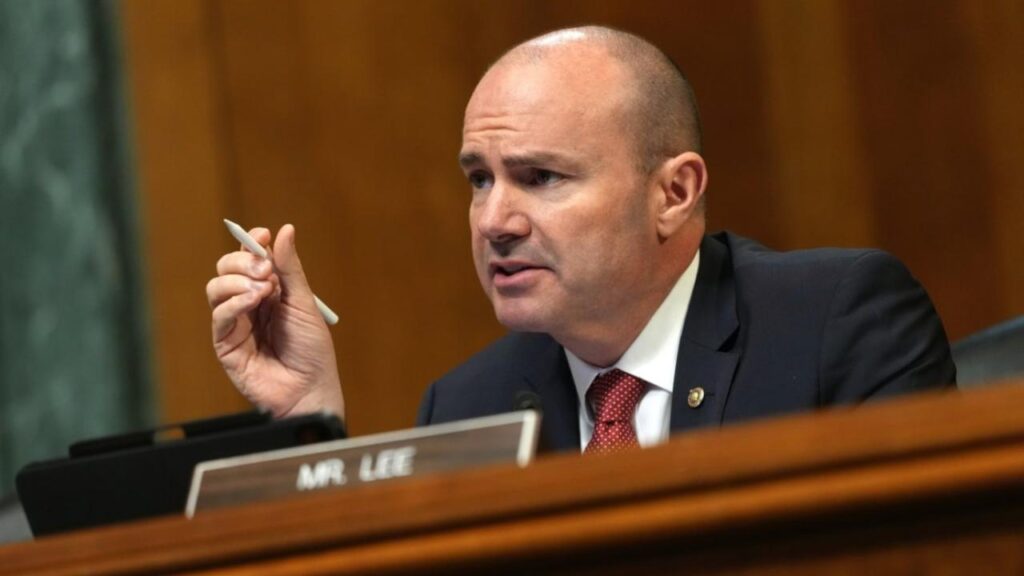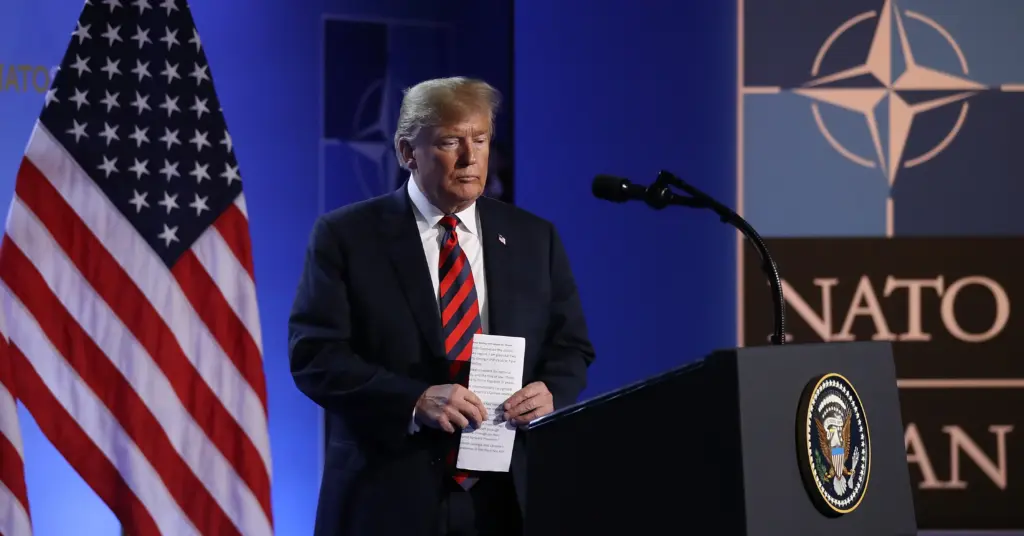The United States is facing a seismic shift in its foreign policy as several influential Republican lawmakers push for a bold proposal that could mark the country’s exit from NATO. A controversial new bill introduced in Congress is reigniting fierce debate over the U.S.’s role in international alliances, with the GOP arguing that it is time for America to refocus on its own interests, and pull away from commitments that may no longer serve its national security.

US Faces NATO Exit as Republicans Push for Withdrawal in Controversial New Bill
| Takeaway | Stat/Fact |
|---|---|
| NATO’s current influence on global security | NATO has 30 member nations and serves as a collective defense pact. |
| U.S. military budget and NATO’s impact | The U.S. contributes over 70% of NATO’s total military expenditure. |
| Public opinion on NATO | 60% of Americans support remaining in NATO. |
The Bill: What’s at Stake?
The bill, sponsored by a group of prominent Republican legislators, calls for the U.S. to withdraw from NATO, citing concerns that the alliance no longer aligns with America’s national priorities. The bill argues that NATO’s collective defense obligations, particularly regarding Eastern European security, are a financial burden on the U.S. and may drag the country into conflicts that don’t directly affect its interests. For years, critics have argued that NATO’s expansion has brought about unnecessary tensions with Russia, while others say that American taxpayers are shouldering too much of the burden for European defense.
Supporters of the bill claim that the U.S. should instead focus on strengthening its own borders and reducing foreign entanglements, a stance that resonates with a significant portion of the Republican base. This move marks an intense shift from the party’s traditional support for the alliance, especially under Republican presidents like Ronald Reagan and George W. Bush, both of whom championed NATO’s role in global peacekeeping.
Why Now? The Shifting Republican Stance
The push for NATO withdrawal has gained traction among Republicans, particularly those who see U.S. involvement in the alliance as an extension of costly globalism that doesn’t prioritize domestic welfare. With the growing influence of isolationist factions in the GOP, this new proposal signals a significant departure from years of bipartisan support for NATO.
In recent years, the debate over NATO has become increasingly polarized. On one side, proponents argue that NATO is essential for maintaining global stability, especially in light of rising tensions with Russia and China. On the other, critics argue that NATO’s reach exceeds its grasp, and that American resources would be better spent on domestic needs like infrastructure, healthcare, and job creation.
The bill itself is seen by many as part of a broader push to limit U.S. engagement in foreign conflicts. By withdrawing from NATO, the U.S. would significantly alter its approach to international diplomacy, defense, and economic relations. Proponents of the bill believe that this move would force European allies to take on a greater share of defense responsibilities, relieving the U.S. of its current obligations.
Global Impact: What Would It Mean for America’s Allies?
A potential U.S. exit from NATO would send shockwaves throughout the global geopolitical landscape. For decades, NATO has been the bedrock of European security, particularly in the face of Russian aggression. Many European nations rely heavily on the alliance’s military umbrella, with U.S. troops stationed in strategic locations across the continent.
The withdrawal of the U.S. would undoubtedly leave a vacuum in NATO’s defense capabilities, forcing European nations to confront their own defense shortcomings. Some experts argue that this could lead to an arms race in Europe, as countries like Germany, France, and Italy would have to significantly boost their own military spending to compensate for the loss of American support.
Moreover, such a move could strain relationships between the U.S. and its European allies, who may view the withdrawal as a betrayal of shared values. The U.S. has long been seen as the leader of the free world, and any signal that America is retreating from its role as the global guarantor of security would have serious implications for its diplomatic credibility.

The Political Battlefield: How Congress is Reacting
The introduction of this bill has sparked an intense debate within the U.S. political landscape. While Republicans are largely unified in their support for the measure, many Democrats are vehemently opposed. For them, NATO is not just a military alliance; it is a symbol of the U.S.’s commitment to democratic values and global stability. The Biden administration, along with key Democratic leaders, has made it clear that they will fight any effort to withdraw from the alliance.
For President Joe Biden, who has been a staunch advocate for NATO since his time as vice president, the proposal represents a stark challenge to the foreign policy legacy of his administration. A move to exit NATO would undermine his efforts to strengthen international partnerships and could alienate key European allies at a time when the U.S. is facing growing competition from China and Russia.
However, there is a strong faction of Democrats who argue that the U.S. needs to reassess its commitments abroad and that NATO is no longer the cornerstone of American foreign policy that it once was. The debate within Congress will likely heat up as the bill moves through the legislative process, and its outcome could have significant ramifications for the future of U.S. foreign policy.
What Would Happen If the U.S. Leaves NATO?
If the U.S. were to leave NATO, it would likely lead to several significant changes on the world stage. NATO’s collective defense pact would be weakened without the participation of the U.S., and the alliance’s ability to respond to global threats, such as Russian aggression or terrorism, could be compromised.
From a strategic perspective, U.S. military operations in Europe would be dramatically altered. The withdrawal would necessitate a reassessment of military bases and personnel stationed in Europe, with potential impacts on the U.S. Army, Navy, and Air Force. Additionally, the U.S. would likely shift its focus more toward the Indo-Pacific region, in line with its strategic pivot towards countering China.
Economically, Europe could see an increased need to boost defense spending to fill the gap left by the U.S., putting pressure on European economies already grappling with inflation and post-pandemic recovery. The geopolitical vacuum created by a U.S. exit could also invite further competition from Russia and China, who could look to capitalize on the diminished U.S. presence in Europe.
The Path Ahead: Is NATO’s Future in Doubt?
As the debate over the U.S.’s future in NATO heats up, many are asking whether the alliance is reaching the end of its usefulness. While the U.S. has long been the backbone of NATO, some believe that the time has come for Europe to take on more responsibility for its own defense. Others argue that the U.S. should remain committed to NATO in order to maintain its leadership role in global security.
In the coming months, this contentious issue will likely dominate headlines, with lawmakers from both sides of the aisle trying to shape the future of American foreign policy. Whether or not the U.S. will ultimately withdraw from NATO remains uncertain, but it is clear that this debate will continue to play a pivotal role in shaping the next chapter of U.S. international relations.
FAQs
1. Why is the U.S. considering leaving NATO?
The push to leave NATO stems from concerns over the financial and military commitments the U.S. has made to the alliance, as well as growing isolationist sentiments within the Republican Party.
2. What would happen to NATO if the U.S. left?
If the U.S. exited NATO, the alliance would face significant challenges, including a loss of military strength, weakening collective defense, and potential instability in Europe.
3. How does NATO benefit the U.S.?
NATO provides the U.S. with a strategic military alliance, bolstering security in Europe and offering a platform for global influence.






